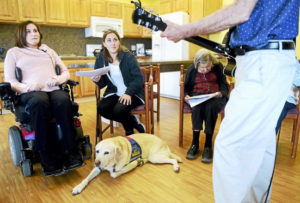By Pamela McLoughlin
NORTH BRANFORD >> Alex Bode, 26, has a rare degenerative neuromuscular disorder that has stolen her ability to walk and severely compromised her movement, hearing, eyesight, speech, cardiac state and spine.
But that debilitating inherited disorder, Friedreich’s ataxia, hasn’t kept Bode from achieving success by any standard.
Despite the obstacles — Bode can’t even feed herself — she is poised to graduate in May with a master’s degree in social work from Southern Connecticut State University – where she has a 3.7 grade point average.
Even more remarkable given all the hurdles, Bode is already making a difference in people’s lives through an internship at Whitney Center in Hamden.
She landed the internship after tries in many places where she says she was faced with discrimination, as so many asked, “How are we going to make it work with your disabilities?” Bode said.
Although her mind is sharp and will not deteriorate from the disease, there are physical obstacles everywhere that also affect her ability to take notes, study and take tests. She needed physical assistance with it all. She also had two spinal fusions through college, as the disease causes scoliosis.
What keeps her going and even achieving so highly against the odds?
“I think it’s just hope that there will be a cure,” she said. “I know they’re working so hard.”
Bode and her service dog, Rochelle, also a therapy dog, are assigned in the memory care unit at Whitney Center, said one of her professors and a private practice therapist, Jack Gesino. Bode talked to residents to gain experience and played games with them.
Gesino said that in an amazing and unexpected twist, Bode’s disability not only didn’t interfere with her work, but enhanced it because the people in the unit with moderate to severe cognitive impairments actually became more attentive all-around in the effort to understand and communicate with Bode.
Gesino said it’s been a “magical” match for all and “It’s been quite a remarkable story.”
The clients were attentive, interactive and smiled a lot with Bode and Rochelle around, Gesino said.
Gesino said Bode has strength, resilience, determination and is inquisitive about all the right things, whether it is school subject matter or interacting with clients. Gesino said she comes to meetings with lists of questions, including how she’ll inform the clients she works with when the internship is over.
“She was not going to leave this year without learning how to work with people,” Gesino said. “She wants to learn.”
He said the management at Whitney Center embraced the idea of having Bode serve there, while he learned through Bode that some other potential internship sites were not so welcoming because of her disability.
Bode, an attractive young woman, said she never imagined herself working with an older population, but fell in love with it once she met the people.
“This may sound weird, but I think because of my disability, I can relate to them,” Bode said. “They have bad days; so do I. They get cold (easily); so do I.”
Bode said that during a meeting in a private room with a client, the woman asked her: “What’s your disability?”
Bode is an excellent listener, patient and empathetic, according to those who know her.
Bode said she’s “always wanted to help people,” and thought about being a nurse when younger, but realized that would be difficult with her physical disabilities.
“So I thought I could help people through talking,” Bode said, noting her speech has gone downhill, “But I do the best that I can.”
Her mother, Mary Caruso, said her daughter’s “determination alone can turn someone’s day into a beautiful day.”
Bode, her older brother, Sam Bode, and Caruso have been raising money for years to find a cure for Friedreich’s ataxia. Caruso is a founding member of Friedreich’s Ataxia Research Alliance, or FARA.
The rare recessive genetic disease — caused by a mutation in the FXN gene — has no course of treatment, although research continues. Alex and Sam Bode were diagnosed with FA in different years.
Before Sam Bode was diagnosed in 1995, he was an accomplished athlete, excelling in sports such as basketball, soccer, karate and horseback riding. After he had trouble walking and maintaining balance, Caruso said she knew something was wrong. The disease progressed quickly shortly after diagnosis.

Photo Credit: Peter Hvizdak
Three years after Sam’s diagnosis, Alex was diagnosed with the same disease. “I was so intent on watching Alex because I knew she had a chance of having it. When she was 6½ years old, I brought her to a cardiologist for an echocardiogram and she had cardiomyopathy. That’s how I knew she had it,” Caruso said.
Read more at the Post Chronicle



